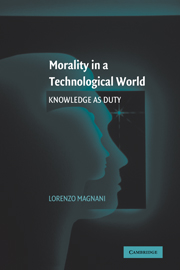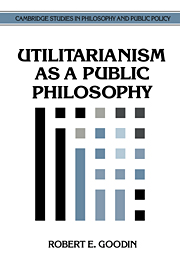Morality in a Technological World
Knowledge as Duty
£37.99
- Author: Lorenzo Magnani, Università degli Studi di Pavia, Italy
- Date Published: October 2009
- availability: Available
- format: Paperback
- isbn: 9780521121798
£
37.99
Paperback
Other available formats:
Hardback, eBook
Looking for an inspection copy?
This title is not currently available on inspection
-
The technological advances of contemporary society have outpaced our moral understanding of the problems that they create. How will we deal with profound ecological changes, human cloning, hybrid people, and eroding cyberprivacy, just to name a few issues? In this book, Lorenzo Magnani argues that existing moral constructs often cannot be applied to new technology. He proposes an entirely different ethical approach, one that blends epistemology with cognitive science. The resulting moral strategy promises renewed dignity for overlooked populations, both of today and of the future.
Read more- Reveals the unexpected ways technology affects our lives
- Examines the status of current ethical reasoning
- Offers different approaches to making ethical decisions and enhancing responsibility in a technological world
Reviews & endorsements
Review of the hardback: '[Morality in a Technological World] is a masterpiece. It is completely innovative. It will change argumentation in several branches of cognitive science forever.' Michael Leyton, Center for Discrete Mathematics and Theoretical Computer Science, Rutgers University
See more reviewsReview of the hardback: 'Magnani provides a stimulating exploration of the ethical implications of the medicalization of life, cybernetic globalization and the commodification of our lives through globalization. This book is essential reading for everyone interested in the impacts of social, economic and technological change on ethical and legal theory.' David Gooding, Director, Science Studies Centre, University of Bath, UK
Review of the hardback: 'This book integrates several fields of ethics, philosophy of technology, epistemology, and cognitive science, developing a completely new and challenging perspective from which Magnani makes the case for knowledge-centered morality.' Li Ping, Sun Yat-sen University
Review of the hardback: 'Magnani clearly articulates the complexity of morality, and the development of a process of treating people as things through which 'we can begin to make peace with inevitable technological advances'. He challenges us to think both cognitively and philosophically about moral and ethical dilemmas, in light of new approaches to technological development. In doing so he awakens important discussions around consciousness, humanity, free will and responsibility, and their interconnectedness; in fact, how do we treat people as things, rather than means? He opens up a space in which we can fruitfully discuss the balance between individual, corporate, national and supra-national needs and expectations, in terms of developing individual self-efficacy and agency. In a period of accelerating technological change, where both individually and collectively we are casting longer data shadows within expanding networks, this is an important and timely discussion.' Journal of Information, Communication & Ethics in Society
Customer reviews
Not yet reviewed
Be the first to review
Review was not posted due to profanity
×Product details
- Date Published: October 2009
- format: Paperback
- isbn: 9780521121798
- length: 308 pages
- dimensions: 229 x 152 x 18 mm
- weight: 0.46kg
- availability: Available
Table of Contents
1. Respecting people as things
2. Treating people as means
3. Hybrid people, hybrid selves
4. Knowledge as duty
5. Freedom and responsibility
6. Creating ethics
7. Inferring reasons.
Sorry, this resource is locked
Please register or sign in to request access. If you are having problems accessing these resources please email [email protected]
Register Sign in» Proceed
You are now leaving the Cambridge University Press website. Your eBook purchase and download will be completed by our partner www.ebooks.com. Please see the permission section of the www.ebooks.com catalogue page for details of the print & copy limits on our eBooks.
Continue ×Are you sure you want to delete your account?
This cannot be undone.
Thank you for your feedback which will help us improve our service.
If you requested a response, we will make sure to get back to you shortly.
×






